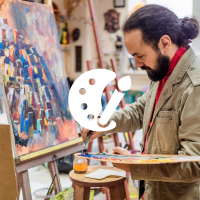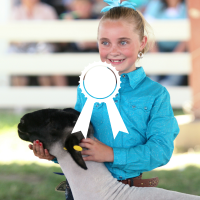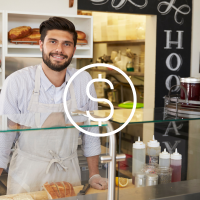Impact
Assessing the impact of our programming is an important part of the work we do at Illinois Extension. Following is a list of Illinois success stories.
How Strengthening Partnerships Helped Enhance Extension Community Broadband Outreach
University of Illinois Extension partners with the Benton Institute of Broadband and Society and the Illinois Office of Broadband to help communities plan for broadband. Extension hosted 35 broadband webinars, and 25 virtual workshops with leaders from 12 counties and 13 communities across the state. This outreach provided information on funding and grants, infrastructure planning, project management, and broadband adoption, inclusion, and use. Extension Educators help communities build collaborations and conduct surveys, to strengthen their proposals for infrastructure deployment. Extension Specialist Nancy Ouedraogo works with Illini Science Policy Scholars to help communities address digital equity, mapping, grant writing, and more.
Local Government Education
Illinois Extension's Local Government Education (LGE) programs help communities build capacity for innovative and informed decision-making to enhance quality of life for residents. LGE webinars help officials and community leaders stay informed of policy issues and emerging trends, and ways to effectively serve their communities. Webinars are offered at no cost, are widely accessible, and can be viewed on-demand from a recording. In 2021, 60 live LGE webinars were viewed by 3,962 participants and recordings registered 4,133 views. Participants spanned 231 Illinois cities and villages. In 2021, more than 2,000 viewers learned about leadership, public service, and community involvement; Extension helped more than 1,000 viewers expand their understanding of how to meet the needs of diverse or vulnerable populations; and as federal and state assistance increased demand for investment planning, nearly 4,000 viewers learned about how to use opportunities and programs. More than 1,000 viewers joined these conversations to sustain and strengthen their communities. When leaders improve their own competencies and effectiveness, they have the potential to positively influence the lives of entire communities and regions.
Nancy Ouedraogo, Extension Specialist, said 94% of respondents reported improved knowledge and 70% reported that their knowledge improved considerably or a lot. The most knowledge gain occurred around the farm family resource initiative, telemedicine, addiction coalition, demographic trends, and affordable housing. Based on registrants who serve in local government or on a board, residents of 112 cities and villages in Illinois can benefit from the experiences of their local leaders participating in the webinars.
Communities Transitioning from Coal Powered Utility Plants
Extension convened conversations to explore how communities can manage when coal powered utilities are decommissioned. Working with local government stakeholders, Extension created a matrix that outlines community recommendations, precedence from other states, and Illinois proposed legislation around four key areas of concern – assessment and taxes; displaced workers; redevelopment considerations and incentives; and environmental impact. This summary has been shared with state legislators, state agencies and with the Illinois Governor and his staff.
Filling the Grocery Gap in Peoria
When two neighborhood grocery stores closed in Peoria, the Regional Fresh Food Council (RFFC) initiated a study to examine the impact on local residents. University of Illinois Extension used secondary data to conduct a retail market analysis providing demographic, socio-economic and health data at the neighborhood and regional levels, and used ESRI’s Business Analyst to analyze consumer spending patterns, market potential, and consumer profiles using tapestry segmentation. Understanding the impact of the store closures was explored through a residential survey conducted by University of Illinois Extension with Bradley University, City of Peoria, Greater Peoria EDC (Economic Development Corporation), and the Caterpillar Community Analytics Team (CAT). More than 900 resident surveys were collected via cluster sampling methodology. Grocery manager interviews were conducted to understand the impact of grocery store closures on existing retail. While this type of study is often used to identify market or business opportunities, communities rarely use these tools to understand shifting markets, or to plan an effective community response to a business which has closed. The information will be useful in designing a response in Peoria. Beyond Peoria, researchers will share the survey tools, reports and recommendations, community responses and discuss the potential to use this methodology in similar situations.
Mercer County Better Together
The community planning process for Mercer County, Illinois began in 2015, and in the past year, guided by University of Illinois Extension, focused on civic engagement and organizational development. Throughout the county, Extension worked with community organizations to host 11 community forums, with nearly 800 county residents attending. Community volunteers helped facilitate meetings, raise funds, promote the process, analyze data, and collect stories from residents about their history in Mercer County. They also connected with residents through online surveys, a Facebook page, and a new website. Through these efforts, Mercer County residents shared their perspectives on potential projects, strategies and goals that Mercer County: Better Together could pursue. To ensure that MCBT could serve as the lead organization to implement plans, University of Illinois Extension helped establish an organizational structure for MCBT that included 501 c(3) certification, the development of bylaws, the establishment of a board of directors, and a plan for a continuing funding mechanism for the organization. Mercer County is on track to confirm a countywide strategic plan that will include input and actionable strategies, a result of Mercer County residents working collaboratively. Watch how Mercer County is better together. Connect with Russell Medley for more information.
Designing Healthy Communities
Designing Healthy Communities, facilitated by University of Illinois Extension, is a sustained campus engagement between University of Illinois Architecture students, the City of Peoria, and residents of Peoria’s Southside neighborhood, one of the poorest neighborhoods in the country. Students participated in a studio workshop designed for community leaders and residents to examine the relationship between health, design, and the built environment, with the aim of providing actionable recommendations to community leaders and neighborhood residents. The students made multiple visits to the community, spoke with key leaders, walked the neighborhood, and discussed design solutions with community residents; then developed and presented design ideas for a safer, more connected, more vibrant Southside. The student projects have been incorporated into city planning documents and grant proposals. Students described the most valuable aspect of the course as “working on real problems.” Faculty and students gained a deeper understanding of the complex issues contributing to urban decay, and the challenges faced by communities to create policies and programs that can spur change. They also discussed the importance of community feedback to determine what is realistic for a community and finding a way to scale ideas for implementation.
Developing the Creative Economy
Developing the Creative Economy was designed for community leaders and economic development professionals who want to tap into the creative talent in their communities to build viable businesses, adding to household income for the entrepreneur and increasing economic activity in the community. The program helps community leaders expand economic and entrepreneurial activity by developing a culture that appreciates and supports the creative talents of residents, including those living in low-resource households. Creative entrepreneurs include artists, designers, musicians, boutique retailers, specialty food producers and other creative enterprises. Connect with Pam Schallhorn for more information.
Economic Impact of Agricultural Fairs
Extension worked with the Illinois Association of Agricultural Fairs to conduct a study of the economic impact of county agricultural fairs. The study surveyed nearly 5,000 fair attendees across the state, conducted 33 key informant interviews, and reports that $170M was spent as a result of the 104 fairs in Illinois. $90 million of these transactions occurred directly in the state economy, demonstrating the significant impact of fairs on local communities. Connect with Zach Kennedy for more information.
Retail Leakage Study and Buy Local Program
University of Illinois Extension partnered with area high schools in Southern Illinois on an initiative aimed at helping our next generation of community leaders understand the correlation between spending money locally and the sustainability of their local economies. Connect with Susan Odum for more information.
Fast Pitch Competition to Support Small Business Development
University of Illinois Extension & the Small Business Development Center at Black Hawk College organized the Henry and Stark Counties Fast Pitch Competition. Results included seven businesses receiving business consultation, six new start-ups initiated, three new business loans, and 10 jobs created or retained. Connect with Russell Medley for more information.









